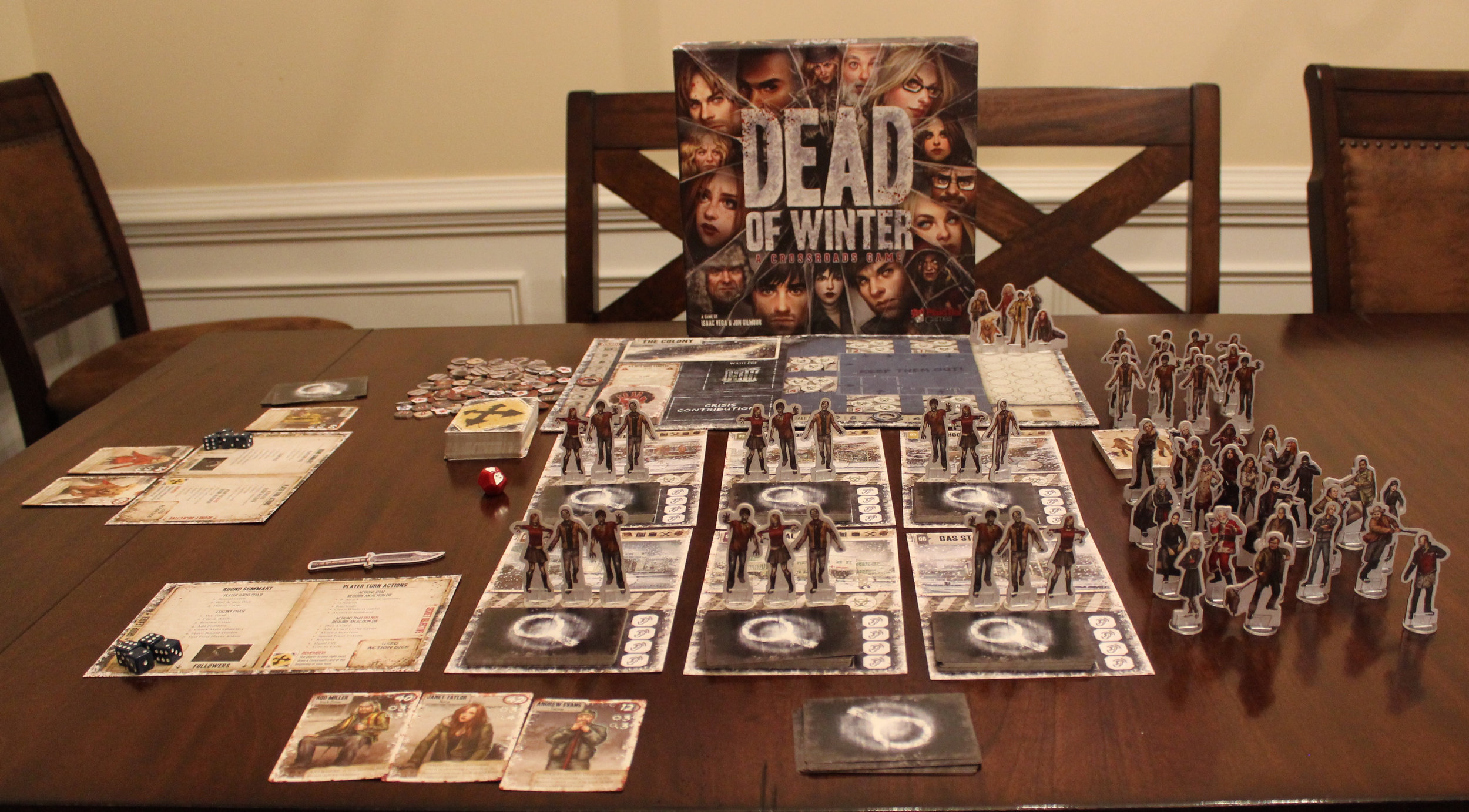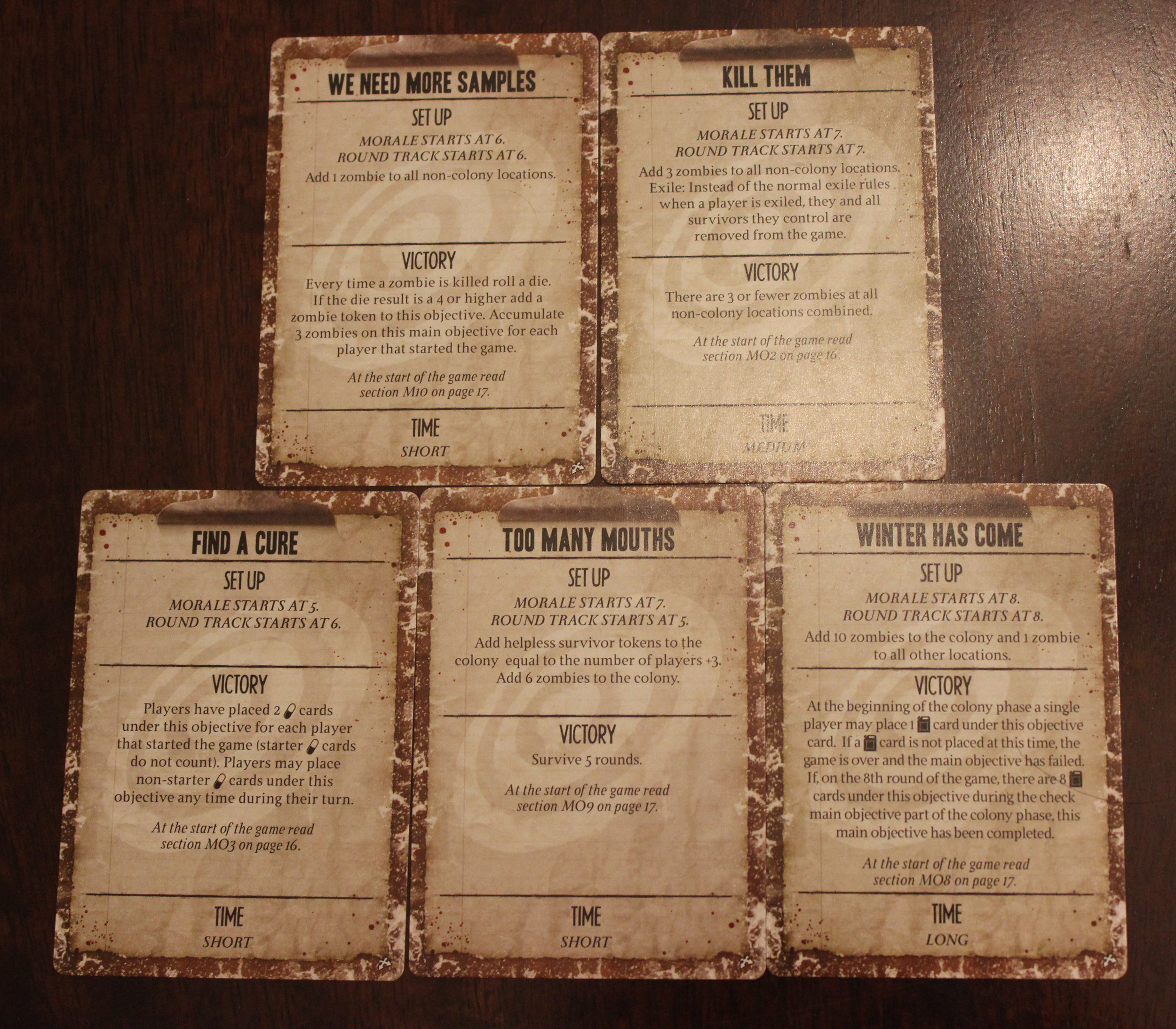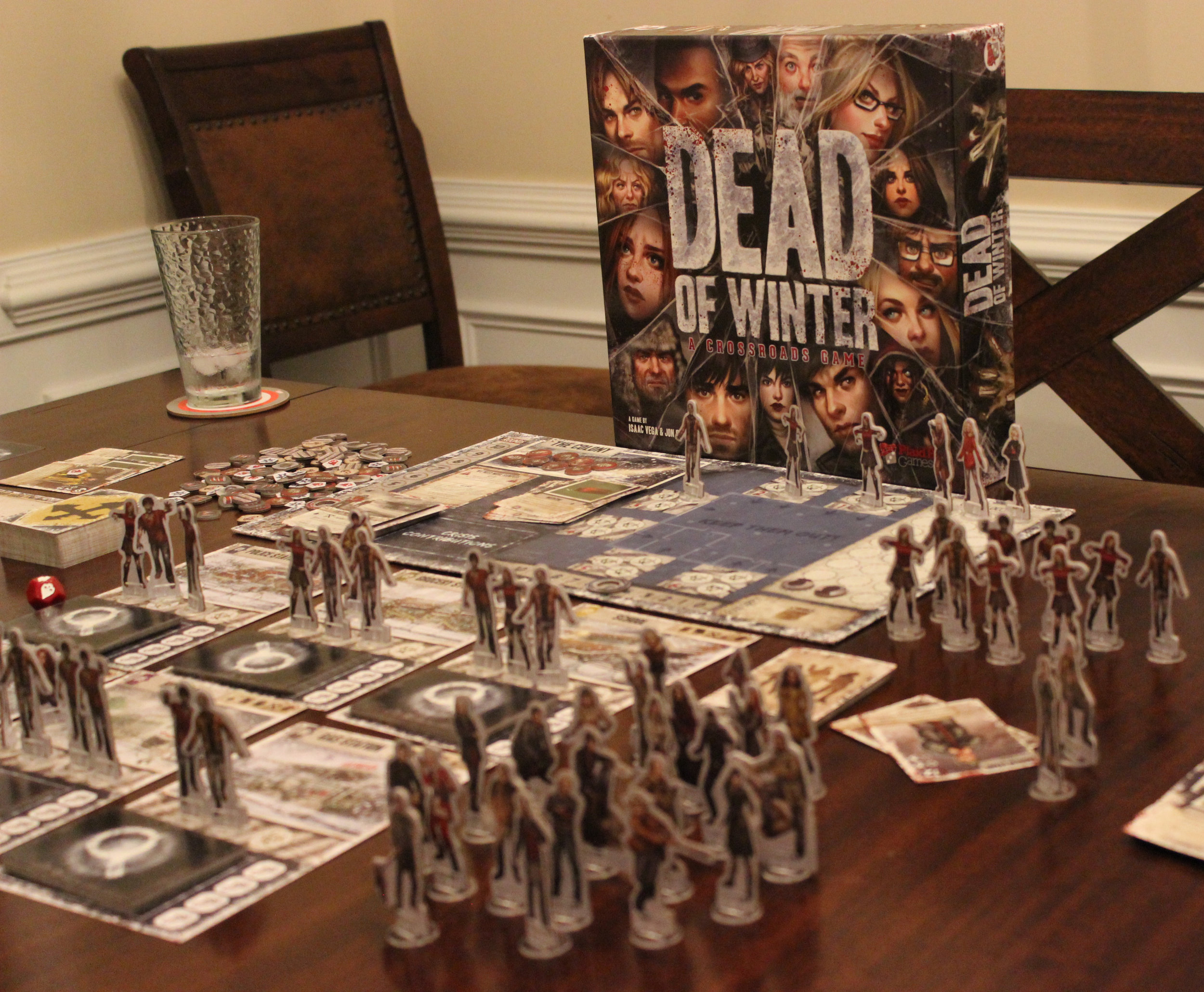Dead of Winter
Cooperative, traitor, dice-rolling, action points, story telling
Designer: Jonathan Gilmour, Isaac Vega
Artists: David Richards, Fernanda Suarez, Peter Wocken
Publisher: Plaid Hat Games
Number of Players: 2-5
Playing time: 45-180+ minutes
Alongside science fiction space operas and Medieval fantasy, zombies are some of the most overused themes in board gaming. It does make sense: it's a popular theme, but zombies as a genre started to hit its saturation point a couple of years ago when it felt like everything was zombie-zombie-zombies. That's why Dead of Winter: A Crossroads Game couldn't have come at a worse time during its release in late 2014. Many people bemoaned what they saw as another zombie game. That is until people saw it in action. Even though it was released in 2014, many gamers didn't get to see it in person until 2015 due to overwhelming demand. It was near impossible to find the game at first, as store copies were flying off the shelves and the major online retailers could barely keep it in stock. So what it is that makes this game so special?
Dead of Winter is a 2-5 semi-cooperative board game that uses storytelling elements, dice rolling, hand management, and secret roles. Each player controls several characters that are occupying a safe location known as "The Colony," while trying to survive the hardest part of winter during the zombie apocalypse. Players must search and fight for resources while battling zombies, the cold, and each other.
How To Win
Each game players choose a main objective to pursue, such as lasting for a certain number of rounds, gathering certain supplies, removing all item cards from areas, collecting samples from zombies, etc. Each objective has a certain threshold that determines how many Rounds the players have to complete it as well as how much Morale they start with. Each objective also has options for a harder game. While Rounds go down naturally, Morale is reduced by character death, starvation, overflowing waste, and failing crises. If the Morale or Rounds hit zero, the game ends with a loss.
How to Play
All player characters start The Colony. There are six locations outside of The Colony that players can explore to find items needed to feed their people, heal injuries, protect themselves, or perform tasks more efficiently. These places include the Police Station, Hospital, School, Gas Station, Library, and Grocery Store. Each have a different ratio of items different from the others, making the locations unique. For example, you're much more likely to find weapons at the police station, and food appears more frequently in the grocery store, obviously. At the end of every round, new zombies appear at these locations and outside of the Colony depending on how many characters are there. Players can move their characters between these locations, but every time they do, they must roll the exposure die.
Exposure die is the red one on the right. Also pictured, the knife to indicate first player and the various tokens used throughout the game.
Ah, the good ol' exposure die. You roll this beast of a d12 every time you move a character or fight a zombie. Six sides are blank: nothing happens and all is well. But three sides are wounds, and if you get three of them on a single character, they die. Two sides are frostbite wounds, which are cumulative wounds that continue to damage you until you get it removed or you die. And finally, there's the bite mark which is instant death. The exposure die means that every time a character moves or fights a zombie, (both of which are crucial to the game), there's a 1/12 chance that the character will instantly croak.
But that's not all! If a character succumbs to a bite, then other characters in that location also risk dying instantly. The character that was bitten has become a zombie, and begins to attack other characters in their location! So other players can choose to let their character die immediately, or roll to see if they survive. If they fail the roll, the character dies and the bite effect spreads again. They are zombies, after all!
Player two has two characters, one of which has a wound. Three wounds and she's dead.
You start the game with two characters. Each character has an influence number (used to determine who is the leader and who will die first if a zombie bite spreads), a special ability, and two numbers that corresponding to Search and Attack. Each player starts the round by rolling dice and using those to perform abilities. If you want to search a location, attack a zombie, build a barricade, clean the wastebasket, or attract zombies to your location, it'll cost the use of one of your precious few dice. So you'll have to coordinate with other players to figure out what the best option is. Should you use your fuel card to move to another location so you don't have to roll for exposure, or save the fuel for a possible crisis later? Should you join your friend at the police station to try and find a weapon, or will that risk too many zombies appearing? Should you stay at the colony and build barricades, or go out and find food? And how can we make sure you complete the main objective, your secret objective, and the current crisis?
Oh, you didn't know about the crisis? Each new round a crisis is revealed that requires players to place items face down in a pile. If they don't complete this by the end of the round, terrible things can happen. This is one of the major tools that the traitor can use to win the game, but more on that later.
Different crises that can occur throughout the game. Notice the required items and what happens if the players fail.
Why It's Special
We went through a very quick and not entirely thorough explanation of the gameplay, but why was this game on everyone's must-have list? It was a combination of three elements, some novel and others used in previous games, that had gotten people's attention.
The Crossroads System
There is a stack of cards known as Crossroad cards, unique to this series of game. In fact, the creators and publisher are so confident in this mechanic that they have created a whole series around it (hence the game's subtitle, A Crossroads Game). There have been talks and rumors about other games using this system (like in space or in a summer camp setting like Friday the 13th), but so far there have only been two games using the mechanic, and both are Dead of Winter games.
Sample Crossroads cards.
Each turn, the person on the active player's left picks up the top card of the Crossroads deck and reads the text to themselves that would trigger the card. Some of the triggers are as simple as "If the player has a character in the Colony" or "If the player moves this turn." Some are quirkier, such as "If any player yawns." If the event ever occurs, the reader stops the player and reads the rest of the card. The first half discusses a situation that the players find themselves in. Crossroads cards can add new characters, change crises, add abilities to existing characters, and create new choices and dilemmas that affect the entire game. The Crossroads system is a really neat concept, and helps elevate the thematic elements and roleplaying aspect of the game.
Secret Objectives
There's a main objective needed to win the game, and smaller crises that need to be completed so that players don't lose too early. But one of the coolest aspects of the game are the secret objectives that are given to each player. Players will not actually win the game unless their objective is complete, and they range from simple tasks like "Have 3 food items in your hand at the end of the game" to difficult ones that require several different items, or that a specific number of characters get killed throughout the game. These are kept secret from the other players, which means your behavior can appear suspicious when you do something counterintuitive for the sake of your objective.
Top row: Sample exile card if a player is exiled. Bottom row: Samples of a traitor and normal secret objective card.
The Traitor
Why would your actions be suspicious? Depending on the type of game you're playing, there's a good chance that a player could be a traitor who is actively working against the other players to win all on their own. These objectives are counter productive to the rest of the team, and all of them need morale to drop to zero to win. This means they'll need to take actions to decrease the morale slowly throughout the game while remaining undetected, or try to lower it all at once at the perfect moment. One of the ways they can do this is by adding cards to the crises that weren't requested, like placing a tool card when it asks for fuel. The traitor needs to be careful though, as players have the option to exile others if they feel it's warranted, removing them from the colony. Any player that is exiled, traitor or not, is given a special "Exiled!" card with a brand new objective.
Things to Keep in Mind
There's no doubt that I love this game, but there are a few issues that should be noted. The main one is that there is a lot of bookkeeping. If you're a rule stickler, it'll take some time to learn all of the ins and outs and still keep up with everything that needs to happen. When I play with newer or inexperienced players, I find that I need to remind them of all the million little things they need to keep track of. Did you roll for exposure when you moved? Do you have food you can use to feed the colony? Did you commit items to the crisis? Did you forget to draw the Crossroads card? Do you know what are overall goal is? What your secret one is? Do I? Where am I? What are we doing right now? It's frustrating when a game is lost because a player from two turns ago goes "Crap, I forgot to put give something to the crises!"
Another little nitpick I have is that the game takes awhile to set up and put away. There are a lot of little pieces, numerous little decks of cards, and zombie and character standees that need to be sorted through so everyone can get their appropriate pieces. Additionally, the randomness of rolling die and looking at the top cards of decks can be a turn off to those who don't enjoy luck in their games. There are a few ways to mitigate chance with items, but it's not a guarantee. this is pure "Ameritrash" and not even remotely like a Euro-style game: it's chock full of heavy theme, dice rolling, and conflict. The exposure die is particularly unfair, and many players lament the fact that the bite mark shows up a lot more often than probability would suggest. I'd say they were merely exaggerating, if I hadn't seen one player roll four or five of them in a single game, including two on their first turn. Losing characters is incredibly frustrating, as having only one character and one die limits your abilities significantly, and you can't always rely on others to give you the cards that will give you another one.
Final Thoughts
This was one of the biggest hits of 2014/15, and is still being played today. While attending Dice Tower IV in June of 2015, I saw people playing this everywhere, and we easily picked up 5 players to play our copy with us. While no longer one of the "new hotness" games, I still saw Dead of Winter being played at Dice Tower V this past summer as well. And speaking of player count, this game works best with 4-5. Two is possible, and three isn't bad, but the game comes into its own with a higher player count. Please note that there is a lot of downtime at higher player counts, and some people might be stuck with little to do. The game comes with several variants for all sorts of players, so if you want a longer game that doesn't have a traitor, or want to include player elimination, then those options are available. If you're really into the game, you can pick up the fantastic promos created by Geek & Sundry and The Dice Tower. There's even an app that will read Crossroads cards out loud.
There is a new standalone expansion out now called Dead of Winter: The Long Night that plays is a game in itself, but can be combined with the first game as well. It adds new mechanics, characters, adversaries, and objectives, as well as a new location. If you're looking to pick up a copy, either will do, but I recommend the original for those unfamiliar with the game or new to gaming.
I recommend this game to any player who enjoys thematic experiences, cooperative play, and/or traitor mechanics in their game. If you love zombies, then you'll love this game too, but the theme is irrelevant. I hate zombies in general, and I love this game and the stories it tells. If you haven't had a chance to play this game, hunt down some friends and a copy and you won't be disappointed. Just make sure you've taken time to review the rules first.
Geekundspiel Rating: Excellent!
















